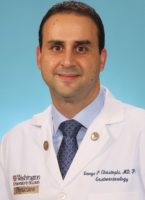 Dr. George Christophi joined the Department of Medicine in the Division of Gastroenterology on September 1, 2017.
Dr. George Christophi joined the Department of Medicine in the Division of Gastroenterology on September 1, 2017.
Dr. George Christophi graduated Summa Cum Laude from Stockton University with a major in Molecular Chemistry and a minor in Holocaust and Genocide Studies. He participated in research at the Mayo Clinic in Rochester and as a Howard Hughes Medical Institute Research Fellow at the University of Pittsburgh. He completed a combined MD, PhD degree from Upstate University in Syracuse, New York with a focus in immunology. He joined the Physician-Scientist Training Program at Washington University School of Medicine and completed his internal medicine residency and gastroenterology fellowship in 2017. He also completed an NIH-funded post-doctoral fellowship in Inflammatory Bowel Disease, examining the role of the microbial metabolome in immune signaling pathways and intestinal epithelial repair, and published his findings in the journal Science.
His overall career objective is to continue performing translational and clinical research and to improve the care and quality of life of patients with inflammatory bowel disease. Being personally diagnosed with inflammatory bowel disease shaped his decision to become a gastroenterologist dedicated in caring for IBD patients. As a patient, he saw first-hand the comfort a knowledgeable and caring physician can offer; he wanted to emulate those qualities and strive to become the kind of physician he admired as a patient. Currently, he is a clinician in the Division of Gastroenterology and provides personalized care for patients with Crohn’s disease and ulcerative colitis. Aiming to bring novel, safer, and more effective treatments for patients with Inflammatory Bowel Disease, he is the principal investigator in several clinical trials at Washington University. In addition, to continue providing excellent, evidence-based care at Washington University Barnes-Jewish facilities, he is leading several institutional quality improvement initiatives in inflammatory bowel disease, including preventive health maintenance and vaccinations.
Dr. Christophi believes that it is important to continue mentoring the next generation of physicians and researchers. He feels fortunate to be working with medical students, residents, and fellows at Washington University in the clinic and on numerous projects relating to inflammatory bowel disease. For example, recently, I-Ling Chiang, a medical student, helped show that vitamin D deficiency can be a biomarker and potential novel treatment for severe primary sclerosing cholangitis (PSC). Dr. Ian Murphy, an internal medicine resident, is looking at the gut metabolome in patients with PSC increased colonic dysplasia. Dr. Ted Walker and Dr. Alex Thomas, internal medicine residents, are examining how utilization of reactive therapeutic drug level monitoring in patients with Crohn’s or colitis can improve clinical outcomes and the role potential gender and racial disparities have in health care.